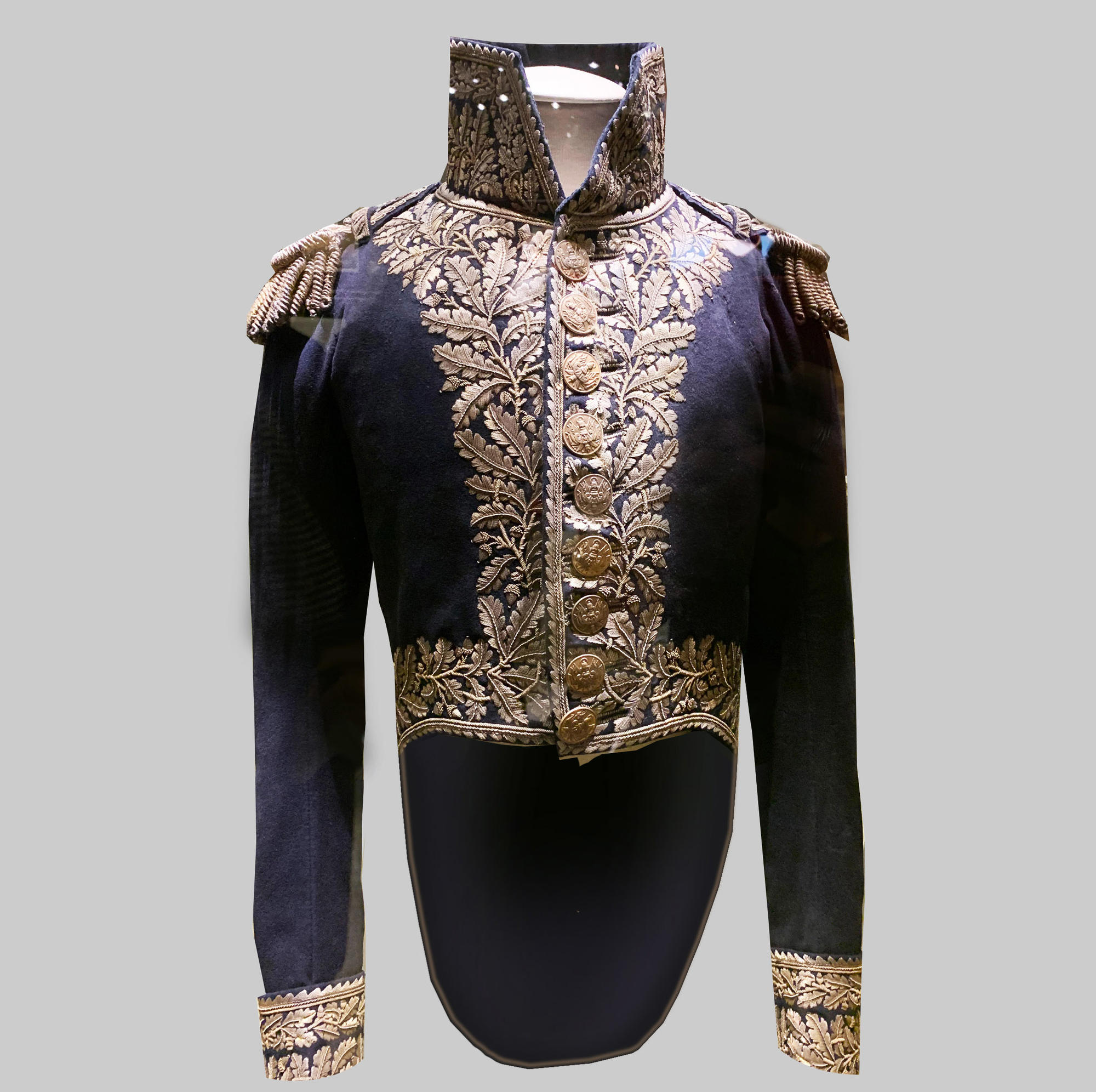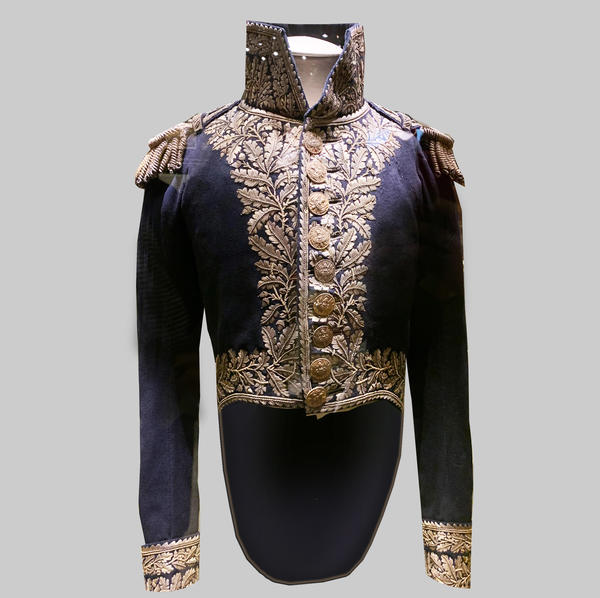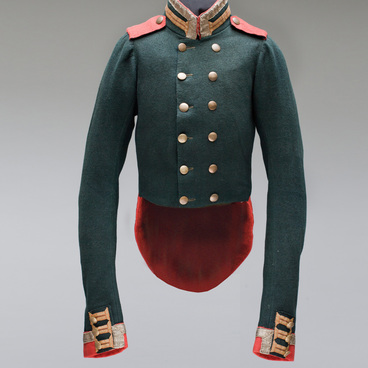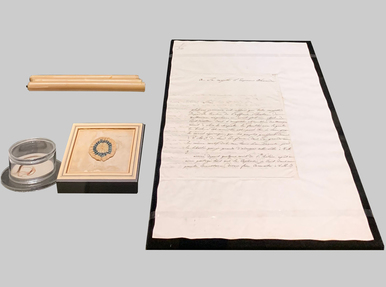The jacket in the showcase from the museum collection probably belonged to one of Napoleon’s army marshals, Louis-Nicolas d’Avout. This assumption is quite valid, given that jacket was found in a captured baggage train. French troops retreated after the battle at the outskirts of Krasnyj town. Clearly, there was no time to salvage it.
The distinct type of uniform maintained a specific status of marshals in the French Empire’s army. In compliance with the Napoleon’s decree issued on the 18th July 1804, marshal needed several jackets, at least four of them: field/marching, everyday, parade, and ceremonial.
Marshal’s jacket was sewn from sound deep blue broadcloth. The same broadcloth was used to make cuffs and the collar. A single-breasted jacket was fastened with nine large buttons with hammered finish. The jacket was decorated with goldwork on epaulets shaped as helixed pendants, and gold- or silver-embroided oak branches with leaves on front, tail, cuffs, collar and along seams.
On the14th September, 1812 (the 2nd September, according to the Julian calendar) Napoleon’s invincible army came up to Moscow. The French were sure, that the decisive battle would happen any moment and the Russian capital would be taken. On the Poklonnaya Hill, there were headquarters, where Napoleon arrived in the afternoon. The French emperor gazed through a telescope at shining gilded church cupolas. He didn’t intend to destroy all this grandeur, no. His plan involved peace treaty, end of his military campaign and further dominance in Europe. And Russia… as his vassal.
A gunshot signaled to two infantry and two cavalry corps to enter the ‘First-throned’. Bonaparte observed the Imperial Guard and vanguard moving. General Eugène de Beauharnais, marshal Józef Antoni Poniatowski, marshal Davout were coming simultaneously through four outposts: Presneskaya, Tverskaya, Kaluzhskaya, and Dorogomilovskaya.
Napoleon expected Moscow boyars to present him with the keys to the city, so he and his Old Guard stopped next to the Dorogomilovskaya outpost in futile waiting. Boayrs did not come. No one came. Instead, reconnaissance and forward units reported that the capital was empty, there was no one there: neither troops, nor civilians. This discovery turned the Emperor’s euphoria into wrath, and he decided to enter Moscow.
It would not be fair to say that the French took Moscow without striking a blow. A group of armed citizens showed resistance. A skirmish happened next to the Trinity gates. French troops fired back two times. Little by little smoke billowed over the city, explosions were heard.
Perplexed and worried, Napoleon Bonaparte stayed overnight in a tavern near the Dorogomilovskaya outpost. He didn’t sleep a wink that night. Suddenly, his invincible army was alerted to put out a blazing fire, which engulfed golden-domed Moscow.
The distinct type of uniform maintained a specific status of marshals in the French Empire’s army. In compliance with the Napoleon’s decree issued on the 18th July 1804, marshal needed several jackets, at least four of them: field/marching, everyday, parade, and ceremonial.
Marshal’s jacket was sewn from sound deep blue broadcloth. The same broadcloth was used to make cuffs and the collar. A single-breasted jacket was fastened with nine large buttons with hammered finish. The jacket was decorated with goldwork on epaulets shaped as helixed pendants, and gold- or silver-embroided oak branches with leaves on front, tail, cuffs, collar and along seams.
On the14th September, 1812 (the 2nd September, according to the Julian calendar) Napoleon’s invincible army came up to Moscow. The French were sure, that the decisive battle would happen any moment and the Russian capital would be taken. On the Poklonnaya Hill, there were headquarters, where Napoleon arrived in the afternoon. The French emperor gazed through a telescope at shining gilded church cupolas. He didn’t intend to destroy all this grandeur, no. His plan involved peace treaty, end of his military campaign and further dominance in Europe. And Russia… as his vassal.
A gunshot signaled to two infantry and two cavalry corps to enter the ‘First-throned’. Bonaparte observed the Imperial Guard and vanguard moving. General Eugène de Beauharnais, marshal Józef Antoni Poniatowski, marshal Davout were coming simultaneously through four outposts: Presneskaya, Tverskaya, Kaluzhskaya, and Dorogomilovskaya.
Napoleon expected Moscow boyars to present him with the keys to the city, so he and his Old Guard stopped next to the Dorogomilovskaya outpost in futile waiting. Boayrs did not come. No one came. Instead, reconnaissance and forward units reported that the capital was empty, there was no one there: neither troops, nor civilians. This discovery turned the Emperor’s euphoria into wrath, and he decided to enter Moscow.
It would not be fair to say that the French took Moscow without striking a blow. A group of armed citizens showed resistance. A skirmish happened next to the Trinity gates. French troops fired back two times. Little by little smoke billowed over the city, explosions were heard.
Perplexed and worried, Napoleon Bonaparte stayed overnight in a tavern near the Dorogomilovskaya outpost. He didn’t sleep a wink that night. Suddenly, his invincible army was alerted to put out a blazing fire, which engulfed golden-domed Moscow.



